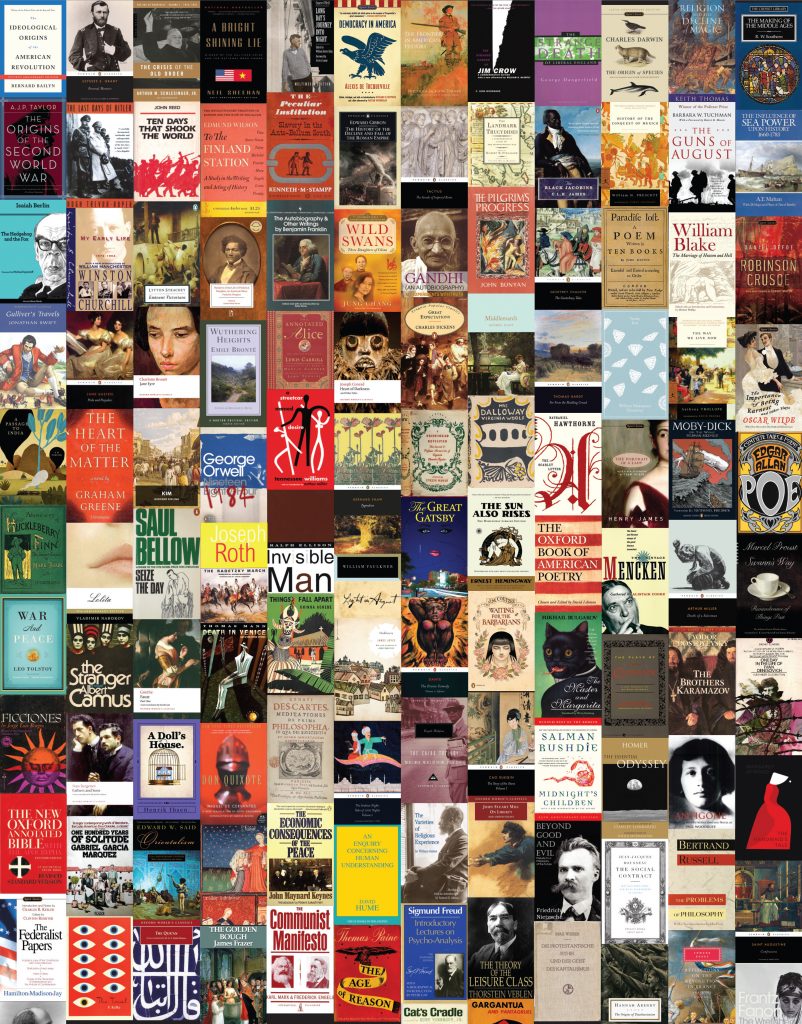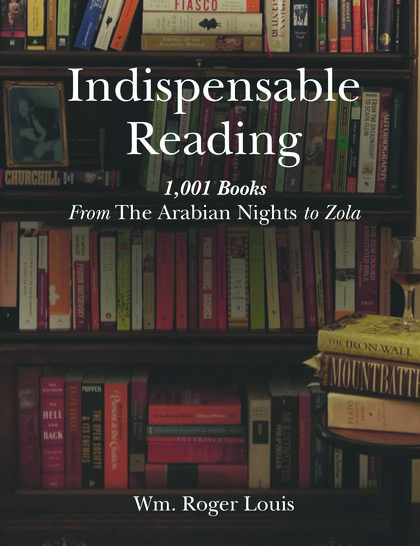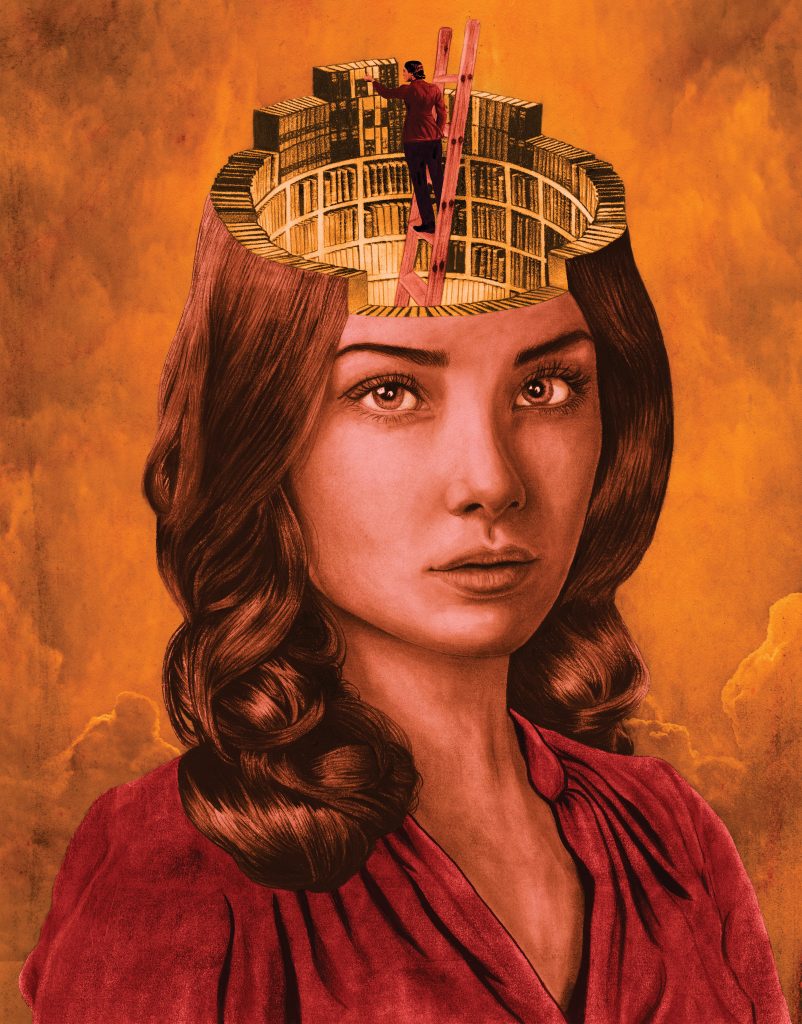Over a period of five years (2013-18) a Faculty Committee on Influential Books discussed, debated and finally compiled a list of intellectually and culturally significant books to encourage reading by undergraduates and provide inspiration for continued reading by college alumni.
The committee benefited from student suggestions and criticism in drawing up the list that mainly represents books in literature, history, politics and philosophy, but its broader range includes the social sciences and the humanities, science and the arts. Seminal works find their place among others notable for humor and wit and still others for an engaging read, as well as long-range intellectual benefit.
The Faculty Committee on Influential Books included Wm. Roger Louis (committee chair), Robert H. Abzug, Randy L. Diehl, Al Martinich, Elizabeth Richmond-Garza and Steven Weinberg.

150 Highly Recommended Books:

Indispensable Reading: 1,001 Books from ‘The Arabian Nights’ to Zola
I.B. Tauris, Dec. 2018
By Wm. Roger Louis
□ Achebe, Chinua, Things Fall Apart
□ Adams, Henry, The Education of Henry Adams
□ The Arabian Nights: Tales of 1,001 Nights
□ Arendt, Hannah, The Origins of Totalitarianism
□ Aristotle, Nicomachean Ethics
□ Atwood, Margaret, The Handmaid’s Tale
□ Augustine of Hippo, Confessions
□ Austen, Jane, Pride and Prejudice
□ Bailyn, Bernard, Ideological Origins of the American Revolution
□ Baldwin, James, The Fire Next Time
□ Balzac, Honoré de, The Human Comedy: Selected Stories
□ Bellow, Saul, Herzog
□ Berlin, Isaiah, The Hedgehog and the Fox
□ Bhagavad Gita
□ Bible
□ Blake, William, The Marriage of Heaven and Hell
□ Borges, Jorge, Ficciones
□ Brontë, Charlotte, Jane Eyre
□ Brontë, Emily, Wuthering Heights
□ Bulgakov, Mikhail, The Master and Margarita
□ Bunyan, John, The Pilgrim’s Progress
□ Burke, Edmund, Reflections on the Revolution in France
□ Camus, Albert, The Stranger
□ Cao Xueqin, The Story of the Stone
□ Carroll, Lewis, Alice’s Adventures in Wonderland
□ Cervantes, Miguel de, Don Quixote
□ Chang, Jung, Wild Swans
□ Chaucer, Geoffrey Canterbury Tales
□ Chekhov, Anton, The Cherry Orchard
□ Churchill, Winston, My Early Life
□ Coetzee, J. M., Waiting for the Barbarians
□ Conrad, Joseph, Heart of Darkness
□ Dangerfield, George, The Strange Death of Liberal England
□ Dante, Inferno
□ Darwin, Charles, On the Origin of Species
□ Defoe, Daniel, Robinson Crusoe
□ Descartes, René, Meditations on First Philosophy
□ Dickens, Charles, Great Expectations
□ Dostoevsky, Fyodor, The Brothers Karamazov
□ Douglass, Frederick, Narrative of the Life of Frederick Douglass
□ Dreiser, Theodore, Sister Carrie
□ Du Bois, W. E. B., The Souls of Black Folk
□ Eliot, George, Middlemarch
□ Ellison, Ralph, Invisible Man
□ Fanon, Frantz, The Wretched of the Earth
□ Faulkner, William, Light in August
□ Fitzgerald, F. Scott, The Great Gatsby
□ Flaubert, Gustave, Madame Bovary
□ Forster, E. M., A Passage to India
□ Franklin, Benjamin, Autobiography
□ Frazer, James, The Golden Bough
□ Freud, Sigmund, New Introductory Lectures on Psycho-Analysis
□ Galileo, Dialogue Concerning the Two Chief World Systems
□ Gandhi, Mohandas Karamchand, The Story of My Experiments with Truth
□ García Márquez, Gabriel, One Hundred Years of Solitude
□ Gibbon, Edward, The History of the Decline and Fall of the Roman Empire
□ Goethe, Johann Wolfgang von, Faust, part 1
□ Gombrich, E. H., The Story of Art
□ Grant, Ulysses S., Personal Memoirs
□ Greene, Graham, The Heart of the Matter
□ Hamilton, Alexander, James Madison, and John Jay, The Federalist Papers
□ Hardy, Thomas, Far from the Madding Crowd
□ Hawthorne, Nathaniel, The Scarlet Letter
□ Hemingway, Ernest, The Sun Also Rises
□ Hobbes, Thomas, Leviathan
□ Homer, Odyssey
□ Hume, David, An Enquiry Concerning Human Understanding
□ Ibsen, Henrik, A Doll’s House
□ James, C. L. R., The Black Jacobins
□ James, Henry, The Portrait of a Lady
□ James, William, The Varieties of Religious Experience
□ Joyce, James, Dubliners
□ Kafka, Franz, The Trial
□ Kant, Immanuel, “Toward Perpetual Peace”
□ Keynes, John Maynard, The Economic Consequences of the Peace
□ Kipling, Rudyard, Kim
□ Lehman, David, ed., The Oxford Book of American Poetry
□ Lincoln, Abraham, Selected Speeches and Writings
□ Locke, John, Second Treatise of Government
□ Macaulay, Thomas Babington, The History of England from the Accession of James II
□ Machiavelli, Niccolò, The Prince
□ Mahan, Alfred Thayer, The Influence of Sea Power upon History, 1660–1783
□ Mahfouz, Naguib, The Cairo Trilogy
□ Mann, Thomas, Death in Venice
□ Manzoni, Alessandro, The Betrothed
□ Marx, Karl, and Friedrich Engels, The Communist Manifesto
□ Melville, Herman, Moby-Dick
□ Mencken, H. L., The Vintage Mencken
□ Mill, John Stuart, On Liberty, and Other Writings
□ Miller, Arthur, Death of a Salesman
□ Milton, John, Paradise Lost
□ Moorehead, Alan, The White Nile
□ Nabokov, Vladimir, Lolita
□ Newton, Isaac, Opticks
□ Nietzsche, Friedrich, Beyond Good and Evil
□ O’Neill, Eugene, Long Day’s Journey into Night
□ Orwell, George, 1984
□ Paine, Thomas, The Age of Reason
□ Plato, Dialogues
□ Poe, Edgar Allan, Complete Stories and Poems
□ Prescott, William H., History of the Conquest of Mexico
□ Proust, Marcel, Swann’s Way
□ Qur’an
□ Rabelais, François, Gargantua and Pantagruel
□ Reed, John, Ten Days That Shook the World
□ Ricks, Christopher, ed., The Oxford Book of English Verse
□ Roth, Joseph, The Radetzky March
□ Rousseau, Jean-Jacques, The Social Contract
□ Rushdie, Salman, Midnight’s Children
□ Russell, Bertrand, The Problems of Philosophy
□ Said, Edward, Orientalism
□ Schlesinger, Arthur M. Jr., The Age of Roosevelt
□ Shakespeare, William, Works
□ Shaw, Bernard, Pygmalion
□ Sheehan, Neil, A Bright Shining Lie
□ Smith, Adam, The Wealth of Nations
□ Solzhenitsyn, Aleksandr, One Day in the Life of Ivan Denisovich
□ Sophocles, Antigone
□ Southern, R. W., The Making of the Middle Ages
□ Stampp, Kenneth M., The Peculiar Institution
□ Steinbeck, John, The Grapes of Wrath
□ Stendhal, The Red and the Black
□ Strachey, Lytton, Eminent Victorians
□ Swift, Jonathan, Gulliver’s Travels
□ Tacitus, The Annals of Imperial Rome
□ Taylor, A. J. P., The Origins of the Second World War
□ Thackeray, William Makepeace, Vanity Fair
□ Thomas, Keith, Religion and the Decline of Magic
□ Thucydides, History of the Peloponnesian War
□ Tocqueville, Alexis de, Democracy in America
□ Tolstoy, Leo, War and Peace
□ Trevor-Roper, Hugh, The Last Days of Hitler
□ Trollope, Anthony, The Way We Live Now
□ Tuchman, Barbara, The Guns of August
□ Turgenev, Ivan, Fathers and Sons
□ Turner, Frederick Jackson, “The Significance of the Frontier in American History”
□ Twain, Mark, The Adventures of Huckleberry Finn
□ Veblen, Thorstein, Theory of the Leisure Class
□ Voltaire, Candide, and Other Stories
□ Vonnegut, Kurt, Cat’s Cradle
□ Waugh, Evelyn, Brideshead Revisited
□ Weber, Max, The Protestant Ethic and the Spirit of Capitalism
□ Wharton, Edith, The Age of Innocence
□ Wilde, Oscar, The Importance of Being Earnest
□ Williams, Tennessee, A Streetcar Named Desire
□ Wilson, Edmund, To the Finland Station
□ Wollstonecraft, Mary, A Vindication of the Rights of Woman
□ Woodward, C. Vann, The Strange Career of Jim Crow
□ Woolf, Virginia, Mrs. Dalloway
□ Zola, Emile, The Dreyfus Affair: “J’accuse,” and Other Writings

